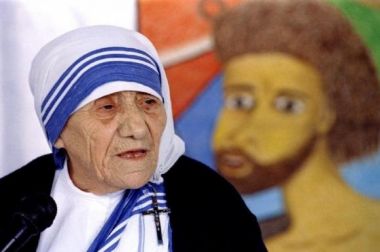Nun, Nobel Prize Winner and soon-to-be saint: Who was Mother Teresa?
Nun and Nobel Prize winner Mother Teresa is soon to be Sainted. Today, the Pope confirmed that she will be made a saint on September 4 this year.
He cleared the way for the Albanian nun to be canonised after her second miracle, the final stage in Catholic saint-making process, was recognised in December. The final approval was made at a meeting of cardinals on Tuesday who presided over her case alongside five other candidates for sainthood.

But who was Mother Teresa?
Born in Macedonia in 1910, Teresa grew up in a home open to the destitute. She was baptised Agnes Gonxha Bojaxhiu and grew up in a devoutly catholic family. Her father, Nikola was involved in the local church and a prominent voice in favour of Albanian independence.
When Agnes was just eight years old, her father suddenly died. Although the cause of death remains unknown, there has been speculation that political enemies poisoned him. After his death, her mother – Drana Bojaxhiu – opened their home to the city's destitute.
Her mother would say: "My child, never eat a single mouthful unless you are sharing it with others." When Agnes would ask who it was sharing their meal, Drana would say: "Some of them are our relations, but all of them are our people."
Agnes was just 12 years old, during a school pilgrimage that she first felt a call to a religious life. Just six years later, at 18, she decided to become a nun and travelled to Ireland to join the Sisters of Loreto in Dublin.
The now-called Sister Mary Teresa then spent 17 years teaching in India, where she became principal of a school and took her vows, becoming Mother Teresa in 1937.
It was not until September 10 1946 that she experienced the "call within a call". On a train from Calcutta to a retreat in the Himalayan foothills, Christ spoke to her and told her to move away from teaching in order to care for the city's poorest and sickest people in the slums.
After training for six months in basic health care, she walked into the slums with the goal to aid "the unwanted, the unloved, the uncared for."
She translated this call into a practical reality, beginning an open-air school and establishing a home for the dying, and in 1950 opened the Missionaries of Charity. By the time she died, the Missionaries of Charity included over 4,000 people, along with many thousands of volunteers, with 610 foundations in 123 countries on all seven continents.
She was awarded the Nobel Peace Prize in 1979 in recognition of her work "in bringing help to suffering humanity."
Her life was dedicated to living out the Gospel, practising "true religion". That experience informed the wisdom with which she spoke. Here are ten quotes from Mother Teresa:
"If you judge people, you have no time to love them."
"Not all of us can do great things. But we can do small things with great love."
"God doesn't require us to succeed, he only requires that you try."
"Live simply so others may simply live."
"Prayer is not asking. Prayer is putting oneself in the hands of God, at His disposition, and listening to His voice in the depth of our hearts."
"I can do things you cannot, you can do things I cannot; together we can do great things."
"Spread the love of God through your life but only use words when necessary."
"I have found the paradox, that if you love until it hurts, there can be no more hurt, only more love."
"The good you do today may be forgotten tomorrow. Do good anyway."
"At the end of life we will not be judged by how many diplomas we have received, how much money we have made, how many great things we have done. We will be judged by "I was hungry, and you gave me something to eat, I was naked and you clothed me. I was homeless, and you took me in."











